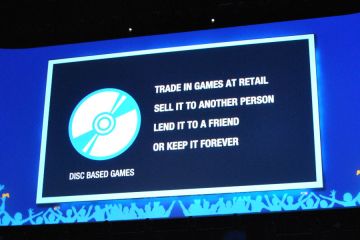Sony seemed to be going through the motions for the majority of its E3 press conference.
Sure, the company spent plenty of time talking about the PlayStation 4, showing off games like Destiny, Kingdom Hearts III and Assassin’s Creed IV: Black Flag. The company made its obligatory mentions of the PlayStation 3 and PS Vita–promising continued support for both–and gave some love to indie game developers. Details from Sony’s PS4 press conference in February were rehashed with some minor new details. It was all pretty unremarkable–even the big reveal of the actual console hardware.
But just as things seemed to be winding down, Sony dropped a few bombs:
- The PlayStation 4 will not have any new restrictions on used, disc-based games. Players will be able to resell, trade or lend their discs to anyone.
- Single-player PS4 games will work entirely offline. Players won’t be required to check in periodically.
- The PlayStation 4 will cost $399 when it launches this holiday season. (Pricing outside the United States is 399 Euros and 349 British Pounds.)
Those first two points wouldn’t be such a big deal if Microsoft hadn’t recently announced major restrictions on Xbox One games. Last week, Microsoft said all Xbox One discs would be tied to a single account, effectively preventing players from loaning their games to friends. Players can still sell their used games, but only to partnering retailers with publishers’ consent. Players can transfer a game to someone else, but only one transfer per game is allowed. Presumably to enforce these policies, Xbox One systems must check in online once every 24 hours, or else games will not work.

The $399 price tag for the PS4–$100 cheaper than the Xbox One–was Sony’s trump card. The crowd at the Los Angeles Memorial Sports Arena went wild. Sony had painted itself as the anti-Microsoft.
There was one bit of bad news, which Sony glossed over at the event: On the PlayStation 4, online multiplayer will require a PlayStation Plus membership. Sony has given away this service since the PlayStation 2 era, but Microsoft proved long ago that players are willing to pay for it. The fact that PlayStation Plus already includes other perks, including a rotating selection of free games, makes a the news a little easier to swallow.
The only risk for Sony is that its policies toward disc-based games could come back to haunt the company. Sony has just assured a long and healthy future for disc-based gaming on the PS4. Microsoft, meanwhile, is trying to kill discs right now, stripping them of their value by using them only to install entire games on the Xbox One hard drive. If Microsoft can get to a fully digital ecosystem first, with complete control over pricing, it may finally be able to lure gamers with the kind of attractive deals that made Steam so popular on PCs. Publishers may also be swayed toward Microsoft’s platform if it restricts or outright destroys the used game market. In a few years, Microsoft’s approach could seem a lot wiser than it does now.
Sony is just betting that the good will of gamers will be enough to cut Microsoft’s ambitions short. And Microsoft has some big ambitions, not just to be the best game console, but to serve as the central hub of all living room entertainment. It’s a gambit on Sony’s part, one that’s going to make the console wars even fiercer.

